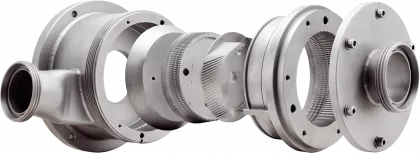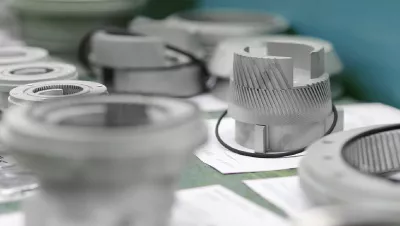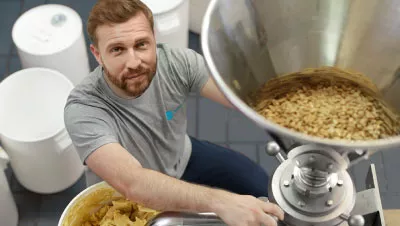Machines for the production of baby food
Machines for the production of baby food
Probst & Class develops and manufactures both individual components and whole plants for the production of baby food.
Every end product needs its own bespoke machine configuration.
Our strategy for perfect customisation: puclab.
Typical ingredients for the production of baby food
Fruits such as apples, bananas, pears, peaches, plums and berries are used in the production of baby food. They provide natural sweetness, vitamins, fibre and other nutrients.
Popular vegetables for baby food are carrots, sweet potatoes, pumpkins, broccoli, spinach, peas and courgettes. Vegetables provide important vitamins, minerals and fibre.
Cereals such as rice, oats, barley, millet and maize are used to make cereal porridge and other cereal products in baby food. They provide energy, fibre and some important nutrients.
Meat and fish: When babies start on solid foods, meat or fish can also be introduced in baby food. Chicken, beef, turkey, salmon or white fish are used for protein-rich meals to help provide iron.
Dairy products: Dairy products such as yoghurt and cheese may be included in certain forms of baby food to meet the need for calcium and other nutrients. When introducing dairy products, it is important to follow the recommendations of the paediatrician or health visitor.
Pulses: Pulses such as lentils, chickpeas and beans are sometimes introduced into baby food to diversify the protein supply. They also provide fibre and other important nutrients.
Process steps for the production of baby food
Prechopping with the perforated disc mill: The PUC perforated disc mill can be used to chop large ingredients such as potatoes, carrots and pumpkins into smaller pieces. The disc mill is also used to break up fibres to achieve a fine texture after grinding with the colloid mill.
Comminution and homogenisation in the colloid mill: The prepared ingredients are put into the colloid mill where they are processed into a fine paste or pulp. In the grinding section of the colloid mill, hydraulic and mechanical cutting, impact, squeezing, friction and shearing forces act to thoroughly grind the ingredients and achieve a smooth consistency.
Production process
Processing and production can be done using Probst & Class mills and systems in a batch process or continuous in-line process, depending on the requirements. We also offer in-line deaeration systems for the extraction of air and other gases. This step is particularly relevant before packaging in order to achieve a clean atmosphere and maintain the product's properties.
We are happy to advise you as to the advantages and disadvantages of the processes as well as plant integration. Please send us an enquiry for our puclab service.
Probst & Class as a supplier to the food industry
Probst & Class mills have been used in state-of-the-art food processing for 80 years. The high manufacturing quality of PUC machines usually guarantees a service life of several decades. The supply of spare and wear parts even for very early models guarantees a safe investment and low total cost of ownership.

Find your ideal machine, reliably and quickly
In the almost 100-year history of Probst & Class, there is one constant: Practically every end product needs its own individual machine configuration!
Two special features of Probst & Class guarantee the highest satisfaction and loyalty of our customers: The simple convertibility of our machines and our approach to customisation.
What has been part of our success for decades is now a strategy. We call this strategy puclab.
puclab is more than a development lab
- System consulting: Holistic concepts for the construction of new systems and the conversion of systems to other products
- Outsourced R&D for our customers' wet grinding, mixing and degassing processes
- Preliminary trials to help decide on the optimal process
- Further development of processes in case of changed specifications
- Application database with test set-ups, test results and videos

puclab – Pilot
Make an appointment for preliminary tests in our pilot plant.
We give you and your product as much time as needed. Together with your technicians/engineers, we determine the best possible configuration for your new PUC machine in our test lab and plan its integration into your process.

puclab – On-Site
Test a PUC mill in your plant or laboratory.
Talk to our technical support to define the requirements for your process and product. We then provide you with a suitable machine, free of charge, and offer support for your in-house trials.

puclab – Remote
Send us your raw materials for testing.
Based on your specifications and materials, we determine the best machine configuration for your end product in our technical centre. Using different grinder sets and settings, we can calculate within a few hours how your new PUC mill needs to be configured, without charge.
Contact our sales department
Still unsure about the best way to proceed?
Simply contact the sales team. We are happy to help you.

- Bitumen Emulsifier: Machines for the Production of Bitumen Emulsion
- Colloid Mills - Try before you buy
- Machines and Colloid Mills for Fungicide Production
- Machines and Colloid Mills for Herbicide Production
- Machines and Colloid Mills for Insecticide Production
- Production of Emulsion Paints with Colloid Mills
- Industrial peanut butter making machine and equipment
- Machines and Colloid Mills for Fertiliser Processing
- Machines and Colloid Mills for Processing Plant Protection Products
- Machines and components for the production of animal feed
- Machines and industrial equipment for the production of vegan cream
- Machines for grease processing and grease post-treatment
- Machines for processing and post-treatment of industrial lubricating oils
- Machines for Processing Soybeans
- Machines for the commercial production of facial cream
- Machines for the Industrial Production of Mayonnaise
- Machines for the processing of collagen
- Machines for the production of hand cream
- Machines for the production of jam
- Machines for the production of meat substitutes
- Machines for the production of plant-based cream alternatives
- Machines for the production of plant-based milk alternatives
- Nut mills and machines for nut grinding
- Peanut Processing Machines and Equipment
- Processing of Paints and Coatings with Colloid Mills
- Processing of Printing Inks with Colloid Mills
- Processing of Digital Printing Inks with Colloid Mills
